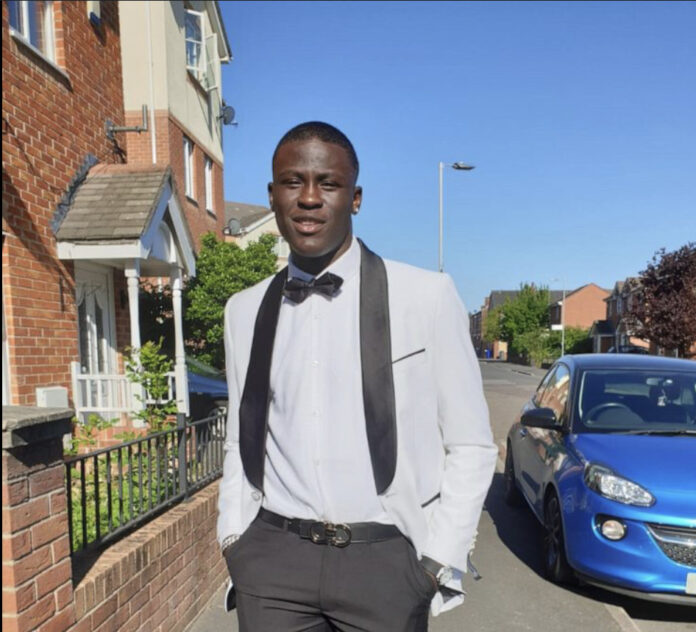The Court of Appeal has quashed the conviction for conspiracy to commit grievous bodily harm of Ademola Adedeji ,one of ten teenagers who were found guilty of using a messaging app to plan the murder or serious harm of individuals they believed were responsible for the death of their friend John Soyoye in Moston in 2020
Soyoye was in a group attacked by thirteen machete and bat-wielding men and boys in Kenyon Lane in Moston in November 2020.
Aged just 17 years old at the time of the offence, he was sentenced to eight years in 2021 detention for sending 11 text messages in a group chat, following the murder of Soyoye
Ade had a place secured to study law at university
As part of a charity initiative, he had authored a book about inspiring his local community in Moston, Manchester, made an address to parliament and was seen by family and friends as driven by a “passion for helping people.”
Prosecutors alleged that Ade belonged to a gang, named M40 after the postcode of the area in which they lived
Ade had been detained for 1181 days, the equivalent of almost six and a half years imprisonment.
In their judgement the appeal court judges said that prosecution was wrong to suggest, during the trial and appeal, that there was a single conspiracy with two intents
They also said that the prosecution and trial judge were wrong to suggest that the acts and declarations in pursuing the separate conspiracy to murder were admissible in relation to the GBH conspiracy
The ruling also said that Racial bias should not form the basis of any decision in a criminal trial, and the court specifically stated
‘It is vital in any case to avoid the unfair stereotyping of individuals, based on their race, as members of gangs’
The Court of Appeal further agreed that the compelling fresh evidence of witness Tyrone Numa meant that Ademola Adedeji’s conviction was unsafe.
Ultimately, it was on this ground of appeal that Ademola Adedeji’s conviction was quashed.
During the trial, the prosecution relied on racial stereotypes to argue that the 17-with no previous convictions, a care worker for dementia patients, rugby player and future law student, was a member of a violent criminal street gang.
A key piece of evidence they deployed was a nine-second video found on the phone of a co-defendant.
In it, a young Black boy is seen wearing a blue bandana. There is music in the background, and some words or lyrics are spoken. The prosecution told the jury that Ademola was that boy and that he was rapping.
Ademola had attended the police station voluntarily to undergo a police interview.
The officer in charge of investigating the case interviewed Ademola for a few hours on that one day. From that brief encounter, he purported to identify Ade in the video clip.
The officer made no notes of what caused him to believe that he had recognised Ade.
Even during his evidence at trial, he couldn’t say why it was he believed that the young Black boy in the video was the same boy on trial. However, it was crucial to the prosecution’s case that the two boys were the same, because despite having access to the Appellant’s phone, and all his social media – it was the only photo, video or post the prosecution could point to where ‘Ade’ was wearing blue, and it was the prosecution’s case that ‘blue’ was the gang colour.
Ademola maintained throughout the trial that it was not him in the video, but someone called Tyrone.
Tyrone was called as a witness by Keir Monteith KC. Tyrone clearly and unequivocally told the judges that it was him in the video; that he was a young man with no previous convictions; that the bandana was not his and he was not rapping.
The three Court of Appeal judges concluded that Tyrone was the person in the video, that PC McGreg was wrong and that it was “necessary to consider the effect of that wrong identification on the safety of Mr Adedeji’s conviction”
Within the trial, the prosecution also suggested that a screenshot of Ademola holding cash to his ear meant he was a gang member. Ade said he was just mimicking what celebrities do – a phenomenon commonly referred to as ‘money-phone’.
In the video, he is not wearing blue and when cross examined by the prosecution, they accepted that that the money had come from legitimate work and never suggested it had come from criminal activity.
The court also reduced the sentences of Raymond Savi and Omolade Okoya, both 21, from eight years to four years and six months each, ruling that their original sentences were excessive. Both had been convicted of conspiracy to cause grievous bodily harm with intent.
However four of the group remain in prison with the convictions and sentencing of Harry Oni, Jeffrey Ojo and Brooklyn Jitoboh, all 21, for conspiracy to murder were upheld. The court also upheld the conviction of Martin Thomas Junior for conspiracy to cause grievous bodily harm with intent.







